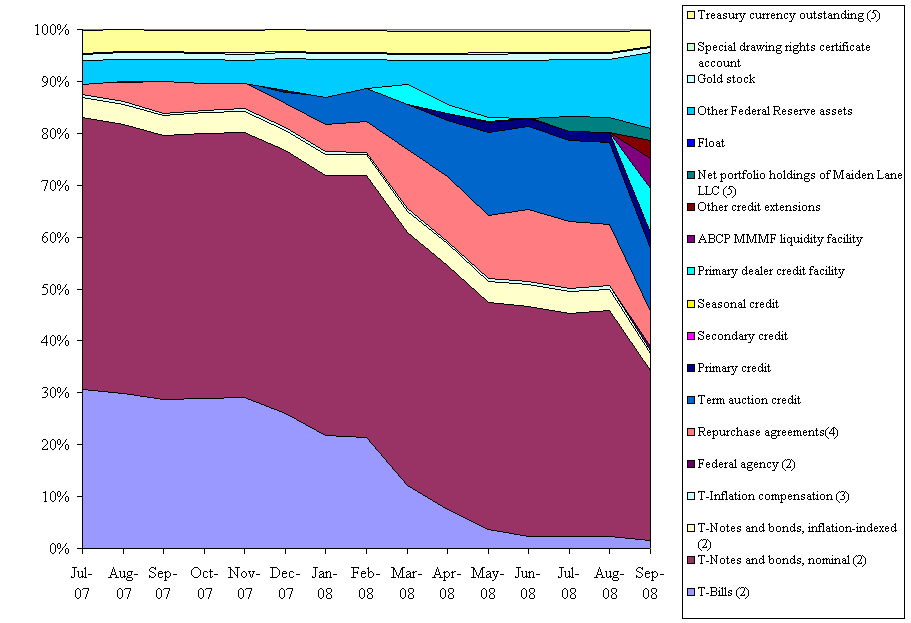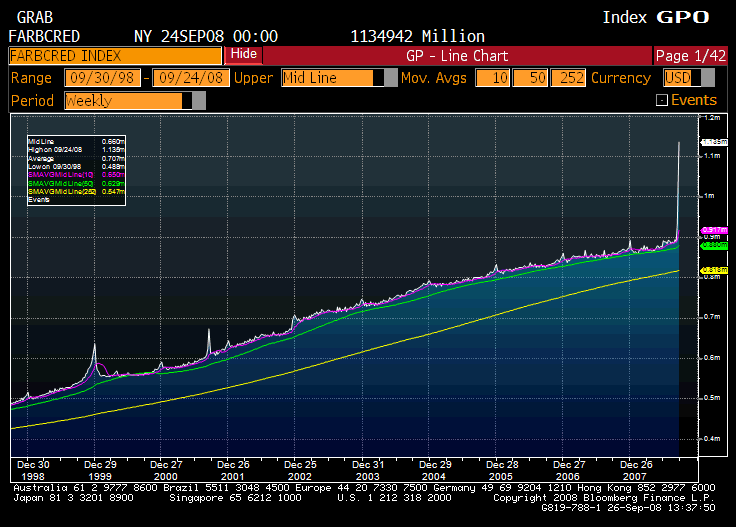I’m starting out tonight’s post with two stories, to try to help illustrate my position on the bailout. Recently I did some consulting for a financial institution that held the single-A tranches of several trust preferred CDOs that had CMBS, REIT debt, and a lot of junior debt from bank, mortgage, and housing related names. They wanted to know where I would market the bonds at year end 2007. I created a really complex simulation model with regime-switching for credit migration, to simulate how creditworthy the underlying bonds would be.
These bonds were on the cusp; the value of the bonds would vary a lot depending on the assumptions used. The bonds below the single-As in the securitization were all likely to eventually default. All they are worth is the value of interest they will get paid before the securitization shuts them off, plus the warrant value if things improved dramatically. The bonds above the single-As were very likely money good. Losses to the AA and AAA bonds were a remote possibility.
After estimating likely cash flow streams, I tried to estimate where a single-B bond would trade in that environment; that is, if it would trade. I estimated that it would need a 20% annualized return, leading to a dollar price around $35 on a par of $100. The bank pushed back in two ways, suggesting that my discount rate was too high, suggesting that I use 10% (price $65), and they trotted out another analysis from one of the subsidiaries of the rating agencies that was incredibly lightweight, suggesting a price of $85.
Now, did these beasties ever trade? Rarely. But they had traded two months earlier between $25-30, and at year end there was one unusual trade, for which I will give you a fictionalized version of how I think it happened:
Bond Owner: I need a bid for my bonds; you brought this deal to the market. Bid on my bonds.
Investment Banker: There is no market for those bonds; no one knows what they are worth. No one is bidding for them in this environment.
BO: You have a moral obligation to bid on my bonds; you brought the deal to market.
IB: So what, at this point almost no investment bank is willing to honor that.
BO: (begging) Look, I’ll take anything, anything, offer me a cruddy “back bid.” I just need to sell these to realize a tax loss.
IB: (long pause, feeling disgusted, and wanting to tell the guy to go away through a too low bid) Okay then, I’ll offer you $5.
BO: (Happy) Done. Sir, you have those bonds at $5!
IB: Done. (Ugh, what will the risk control desk say?…)
What did I tell my client? I said that I would tell them what my model yielded under their assumptions, but that my recommendation was that they mark them at $35.
Okay, so what’s the right price? $5, $35, $65, $85, $100. The bank marked them down to $75, average of the 10% discount rate and the rating agency’s view, because they could not take the full hit.
Now apply this lesson to the current bailout, and what do we learn?
- The hold-to-maturity price mentioned by Bernanke is the $75, a value that has no basis in fact.? They don’t want to have the bank take losses.
- The price that a clever investor would pay if he could buy-and-hold is below $35.? Where?? Not sure, thing have gotten worse since my analysis.
- The security is worth at least $10, if it pays interest for three years (highly likely).
- The investment bank that bought the bonds can’t re-sell them.
- Most bond owners ignore the $5 trade, and ignore the $25-30 trades also.? They mark the bonds much higher, because they can’t take the losses.? They are eating an elephant.? How do you eat an elephant?? One bite at a time.? They can’t take a full loss this year, but will use flexible accounting rules to take those losses over the next three years.
- A clever bailout would start sucking in these bonds in the teens, quietly.? We’re not doing that, but that is what Buffet would do, and maybe Bill Gross.
- But these bonds are unique, as are most credit sensitive bonds.? The idea of holding reverse auctions is ridiculous, because I have given you one example, and there are hundreds of thousands, maybe a few million different bond tranches to evaluate.? Only the originally AAA-rated tranches have any size to them.? For any party, even PIMCO, to say that they can come up with the proper pricing for all of them is ludicrous, regardless of whether we go for the panic price, theoretical current “fair price,” or the price at which it is on the bank’s books.
- This also discourages banks from taking writedowns.? Why write down, when the government will pay you book value?? Or at least, the lowest book value that is common….
Well, that’s one story.? Here’s one more: As a bond manager, I would occasionally come up with unsusal theses that would translate into inquiries after unusual assets.? in late 2002, I began buying floating rate trust preferred securities.? Junior debt — not as safe as senior debt, but because they were floating rate, they did not have the same call provisions as the fixed rate securities.? There could be a lot of profit if the credit market rallied.? So, I started buying slowly, because it is not a thick market, using three brokers to mask my actions.? By the time, I reached 90% of my goal, two things happened.? First, the chief investment officer called to ask what I was doing buying such low yielding securities.? My comment back was that I was earning more than a 5-year senior bank bond, and that it improved the asset-liability match for our insurance client.? He said that he didn’t want much more of them, and I said that I wanted $20 million more.? He agreed, and we were done.? Second, one of the three brokers, the one that I used the least, called me and said that their bank thought there was a buyer in the market, and that prices would rise from here.? I asked what they had left in inventory, and he named a few names that I did not have so much of.? I bought those bonds, and then (after a few weeks) the market repriced dramatically tighter, i.e., higher prices.? We never cleared less than a 10% gain on any of those bonds, which is a “home run” in bond terms.
Here’s my point: the Treasury, should it do the bailout, will find it hard to determine the proper prices for the bonds they want to buy. Why?
- High prices bail out the banks.
- Low prices protect taxpayers.
- No one knows the correct price.
- Anyone with a large amount of money to invest will artificially inflate the market, unless they are very careful.
The negotiations have broken down, and it is for a good reason.? There is little agreement over what costs the taxpayers should bear for matters that they had little say in creating.? I offer you the following articles that agree with my findings:
With respect to the central question, “Will the Bailout work?” my answer is no.? The assets are too fragmented, and the policy goals too uncertain to make the deal work.
We will see what happens tomorrow.? The Cantor plan may play some role in this, trying to restructure the bill as a reactive bill through an insurance mechanism, while making it sound proactive.? That is prefereable to me, because I think that the next administration whould take time to analyze the best options, rather than let an unaccountable lame duck President and Congress set the tone.? If bailouts are needed because of systemic risk before then, let them be done on a one-off basis.? We don’t need a systemic solution now.
What is the crisis at present?? It is mainly in the short-term lending markets.
That’s not good, because they are big markets, but on the other hand, the percentage losses aren’t large.? Again, I would call Congress to oppose the bailout, in order to let the next President and Congress consider the measure.? Until then, I would do one-off bailouts, like those done for AIG and Fannie, and Freddie.
That may not be optimal policy, and it might be messy, but it might minimize cost to the taxpayers, while causing those that would sell off liabilities to the government to think twice.? Bailouts shoud be painful.



